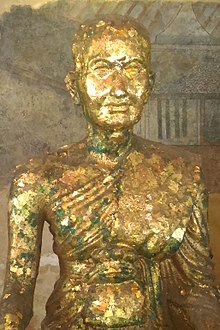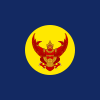Paramanuchitchinorot
Somdet Phra Maha Samana Chao Kromma Phra Paramanuchitchinorot | |
|---|---|
 Statue of Kromma Phra Paramanuchitchinorot at Wat Pho | |
| Supreme Patriarch of Siam | |
| In office 1851 – 9 December 1853 | |
| Personal | |
| Born | Prince Wasukri 11 December 1790 |
| Died | 9 December 1853 (aged 63) |
| Religion | Buddhism |
| Nationality | Thai |
| School | Theravada |
| Dharma names | Suvaṇṇaraṃsi |
| Senior posting | |
| Predecessor | Ariyavangsayana (Nag) |
| Successor | Pavares Variyalongkorn |
Paramanuchitchinorot (Thai: ปรมานุชิตชิโนรส, RTGS: Paramanuchitchinorot or Poramanuchitchinorot; also spelt Paramanujita Jinorasa, Paramanujit Jinoros, etc.; 11 December 1790 – 9 December 1853) was a Buddhist writer and a prince of the Chakri dynasty. One of his well-known epic poems is Lilit Taleng Phai.[1] In 1851 he was appointed the Supreme Patriarch of the Rattanakosin kingdom and remained in that position until his death.
Life
[edit]Prince Wasukri (Thai: วาสุกรี) was a child of King Rama I and royal concubine Lady Chui (Thai: จุ้ย), a Vietnamese noblewoman. Lady Chui was the daughter of Ong Wang-tai (Phraya Phakdinuchit), a man of high-ranking royal blood who fled Vietnam after the Tay Son rebellion of 1778. [2] He was born at the Grand Palace he was the king's twenty-eight child. In 1802, he became a Samanera or novice monk at the age of 12 years old, eight years later he was ordained a Bhikkhu monk. As a monk he resided at Wat Pho and studied to become a religious scholar there. He was also learned in the Khmer and Pali languages. In 1812 he was made the abbot of the temple.[3]
King Rama III, who was his nephew, frequently called upon him to write, translate, and compile books. During his reign the king gave his uncle the ecclesiastical rank equivalent to that of a deputy patriarch, in which he was put in charge of all the temples within Bangkok. The prince abbot was also a prolific poet and composed many religious and sacred verses. Many of these verse were made into inscriptions which can be found all over Wat Pho today, making the temple a place of worship and a place of learning.[3]
In 1851, the new monarch, King Rama IV, appointed the abbot as the Supreme Patriarch of the kingdom, and he was given the official title Phra Chao Boromawong Ther Krom Phra Paramanuchitchinorot. Unfortunately, this honour was briefly held, as he died on 9 December 1853. His body lay in state for a full year before his cremation.[3]
His residence at Wat Pho, Tamnak Wasukri, also called the poet's house, was built by Rama III as a gift, it is open once a year on his birthday.[3][4]
On 12 April 1921, in the reign of King Rama VI an additional title was created to denote his status as both a royal prince and patriarch of the kingdom. From then on he was known posthumously as Somdet Phra Maha Samana Chao Krom Phra Paramanuchitchinorot.[5]
References
[edit]- ^ "Paramanuchit". Academic Dictionaries and Encyclopedias. Retrieved 14 March 2020.
- ^ Ethnicity and the Galactic Polity: Ideas and Actualities in the History of Bangkok, Journal of Southeast Asian Studies 49, 1 (2018): 129–48.
- ^ a b c d Matics, Kathleen I. (1971). "Homage to the Abbot Prince Paramanuchit Chinorot" (PDF). Journal of the Siam Society.
- ^ "Wasukri Residence, Wat Phra Chetuphon". Archived from the original on 30 March 2016. Retrieved 19 March 2016.
- ^ Royal Thai Government Gazette (12 April 1921). "พระบรมราชโองการ ประกาศ สถาปนาสมเด็จพระมหาสมณเจ้า (Royal Decree on the Elevation of the Prince Patriarch" (PDF). ราชกิจจานุเบกษา. เล่ม ๓๘, ตอน ๐ ก: หน้า ๑๐. Archived from the original (PDF) on 13 November 2011.
- Supreme Patriarchs of Thailand
- Thai poets
- Buddhist poets
- 1791 births
- 1852 deaths
- Thai Buddhist monks
- 18th-century Chakri dynasty
- 19th-century Chakri dynasty
- Thai male Phra Ong Chao
- People from Bangkok
- 19th century in Siam
- 19th-century non-fiction writers
- 19th-century poets
- Thai male non-fiction writers
- Sons of kings
- Thai people of Vietnamese descent
- Buddhist clergy stubs
- Thai people stubs
- Asian religious biography stubs
- Theravada stubs


